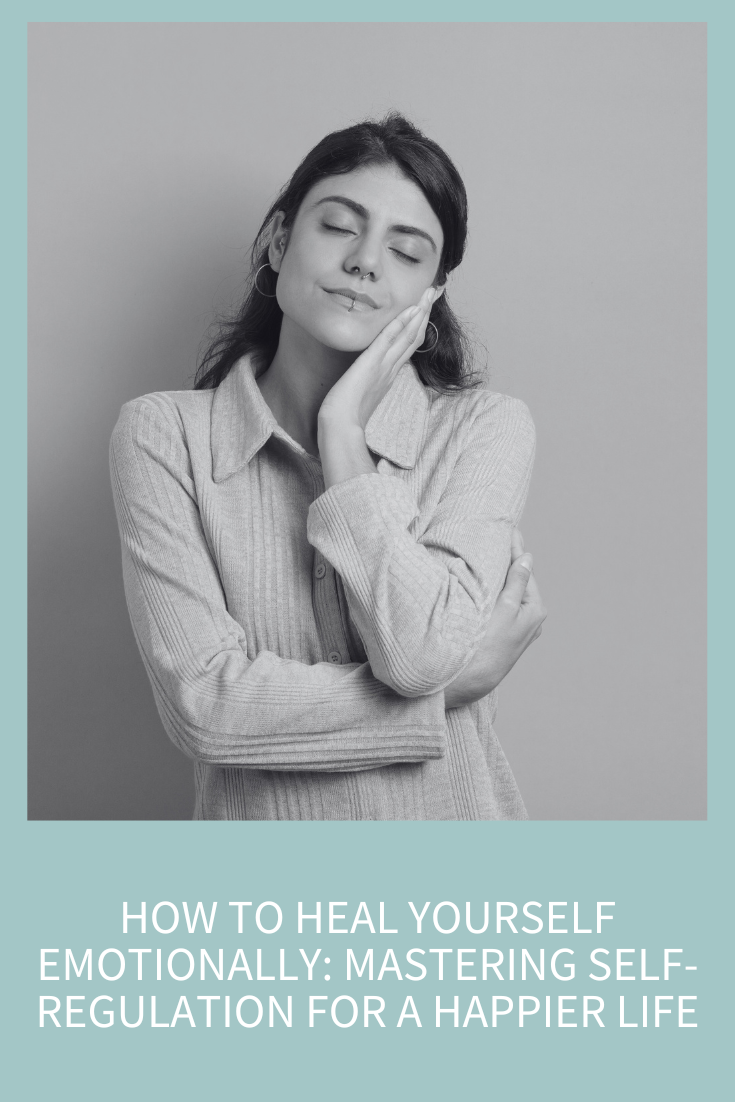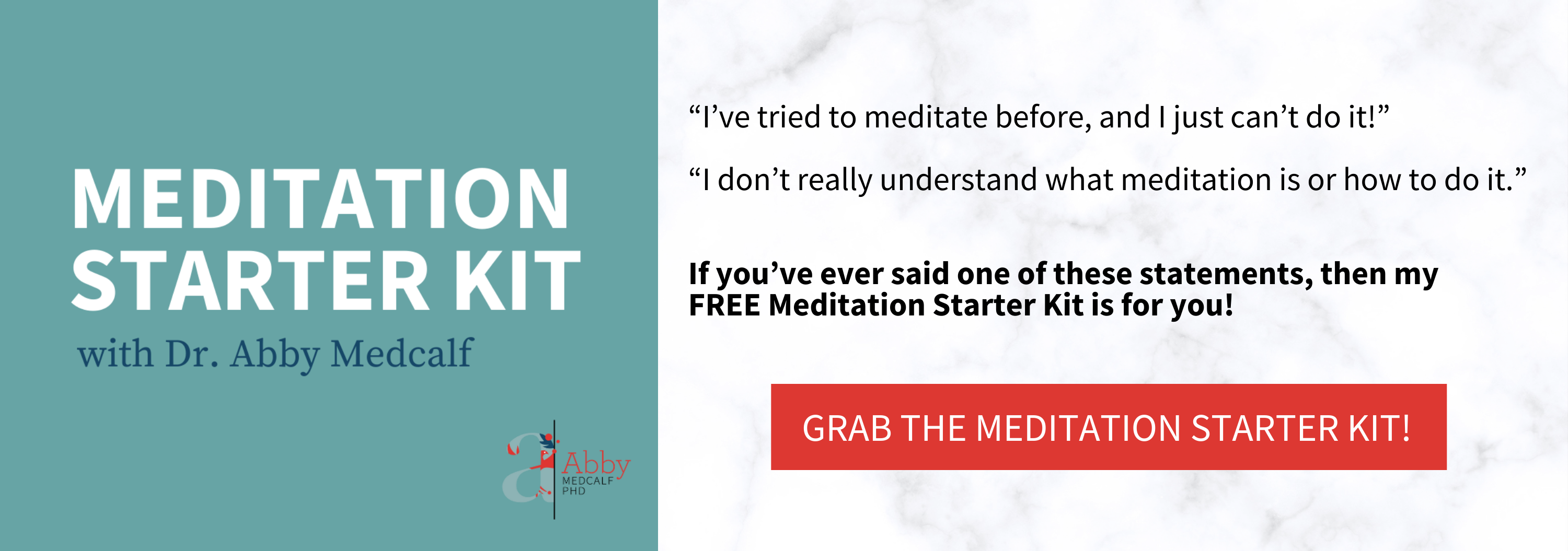
You’ve talked about your past and likely know a lot of the reasons why you’ve got issues (I say with love). The problem is that even though you might know the why (or think you do), you don’t feel better. You continue to repeat unhealthy relationship cycles and you’re still not maintaining your boundaries with others. Or maybe you’re overeating or smoking too much pot. You know why you’ve got some dysfunctional habits, but that hasn’t resulted in you healing emotionally. Talking about your childhood or a bad relationship, initially is great, but spending all your time on the why and not on the how is keeping you stuck. Healing yourself emotionally is comprised of three main areas: 1) learning self-regulation, 2) mindfulness, and 3) self-acceptance/self-compassion. Today we’ll be focusing on that first step, self-regulation. Next week, we’ll tackle mindfulness and self-acceptance/compassion.
9-minute read
Quick update on the One Love Collective! My online community is going to be starting on a platform called Patreon. You can sign up by going to Patreon.com/abbymedcalf or go to my website and there’s now a tab at the top of the page that says Patreon. Click on that and you’re in. There are 3 tiers priced at $5, $8, and $12 per month and what you get in each tier is explained when you get there. But I wanted to give you a heads up now that if you sign up for Tier II or III, the first Live Ask Dr. Abby Q&A is going to be on Wednesday, January 22nd at 12:00pm Pacific time. If you can’t make it, these are taped, and you’ll be able to easily find them whenever you log into Patreon. The live Ask Dr. Abby Q&A’s will be on the second and fourth Wednesday at 12:00pm Pacific moving forward.
Introduction
If you want to heal emotionally, you have to focus on what you’re doing now, not what happened in the past. It’s great to speak about your past and get clear, but the big mistake I find clients making is that they just want to keep talking about their childhood or a bad breakup and not focus on what they can do now. How do you know if you’re talking too much about your past? It’s when nothing changes. You talk and talk and maybe get a few moments of peace or clarity, but then you’re back to old “stinking thinking” or unhealthy behaviors. You also don’t feel better (and likely feel worse). Talking about your past won’t heal you. Taking action will. But you need to take the right action.
As I said earlier, you heal yourself emotionally by getting good at three components: 1) learning self-regulation, 2) making mindfulness a habit, and 3) practicing self-acceptance/self-compassion. The trick is that you need to do these in that order. Too many people are trying to practice self-acceptance, but they haven’t had any experience in self-regulation or mindfulness, so it’s incredibly hard to work on your self-compassion or acceptance, and you give up! Doing these in order will completely change the game for you. So today is all about that first step, and then next week, we’ll tackle the other two.
Mastering Self-Regulation
Do you ever find yourself snapping at your partner, regretting an impulsive email to your boss, or feeling overwhelmed by emotions when your kids or your mom won’t listen? These moments can make you feel out of control and disconnected. Enter self-regulation: the ability to manage your emotions, thoughts, and behaviors in a way that aligns with what you say are your values and goals.
Mastering self-regulation isn’t just about avoiding blow-ups; it’s about cultivating deeper connections, reducing stress, and improving every relationship in your life. Research shows many benefits of self-regulation:
- Self-regulation predicts relationship satisfaction by fostering better conflict resolution and communication.
- Emotional regulation is linked to lower levels of anxiety and depression (and overall reduces mental health symptoms).
And before we get too carried away talking about self-regulation, I want to take a moment and discuss the difference between self-regulation and emotional management. While emotional management focuses on identifying and modulating your emotional responses in the moment, self-regulation encompasses a broader ability to align thoughts, emotions, and behaviors with long-term goals. It’s the difference between calming yourself down during an argument (emotional management) and consistently acting in ways that strengthen a relationship over time (self-regulation).
I’ve done a previous episode with a step-by-step guide to managing your emotions that I’m super proud, of as well as having a chapter in my latest book, Boundaries Made Easy, dedicated to this topic, so please make sure you check out one of those because this is a very important piece of your self-regulation and I can’t include all that information here because this would be a three-hour episode!
Defining Self-Regulation
So, what is self-regulation exactly? Self-regulation is the ability to control your emotional responses, impulses, and behaviors to achieve your long-term goals. It’s about responding thoughtfully rather than reacting impulsively. I always say it’s about acting, not reacting.
In relationships, self-regulation helps you:
- Stay calm during heated arguments.
- Avoid saying or doing things you’ll later regret.
- Communicate effectively even when emotions are high.
Poor self-regulation harms your relationships and your overall well-being. Impulsive reactions or emotional outbursts damage trust and create distance in your connections with others. On the flip side, strong self-regulation improves communication, builds trust, and fosters a sense of safety in relationships. Research even shows that self-regulation is linked to better mental health and higher life satisfaction.
We psychologists usually divide self-regulation into two components:
- Emotional regulation: Managing how you experience and express emotions.
- Cognitive control: Aligning your thoughts and behaviors with long-term goals, even when you’re under stress.
There are four key skills involved in self-regulation:
- Emotional Regulation: Managing emotions effectively so they don’t overwhelm you or others.
- Impulse Control: Pausing before reacting to avoid harmful words or actions.
- Goal Alignment: Focusing on long-term relational or personal goals rather than short-term wants and desires.
- Stress Management: Staying calm and composed under pressure to think clearly and act purposefully.
Let’s dig deeper into each one.
1. Emotional Regulation
Emotional regulation is about recognizing and processing emotions in a healthy way. It’s not about suppressing emotions but understanding and channeling them constructively.
Steps to Improve Emotional Regulation:
- Identify Triggers: Keep a journal to track situations that provoke strong emotions. For example, does your partner’s criticism make you defensive?
- Name Your Emotions: Use specific words to label what you’re feeling. For example, instead of saying, “I’m angry,” try, “I feel hurt and unappreciated.” Because I love you, you can download a list of emotions here.
- Practice Mindfulness: Techniques like deep breathing or meditation can help you observe your emotions without judgment (we’ll go deeper on this next week).
- Reframe Your Perspective: Shift from “This is unfair” to “What can I learn from this?”
2. Impulse Control
Impulse control allows you to pause before reacting, giving you time to consider the consequences of your actions. The research shows over and over again that regular meditation and mindfulness are the very, very best (did I say very?) things you can do to improve your impulse control.
But here are four more things you can do to get better at acting, not reacting.
- Count to Five: Count to five before responding to a trigger. This brief pause can prevent knee-jerk reactions.
- Visualize Outcomes: Ask yourself, “What’s the best and worst that could happen if I react this way?”
- Ground Yourself: Engage your senses (touch, smell, sight) to bring yourself back to the present moment. You can download a list of Grounding Techniques here.
- Set and Maintain Your Boundaries: I preach boundaries all the time, I know, but as I say, they’re the not-so-secret-secret to a happy life. You can buy my book, Boundaries Made Easy, get the Boundaries Made Easy Workbook (coming soon!), or I’ve got many free options you can find by searching for the keyword boundaries on my website or on my YouTube channel. No matter how you do it, you’ve got to make boundaries a priority so you can better prepare responses for situations where you’re likely to lose control (and to avoid even getting into those types of situations).
3. Goal Alignment
Goal alignment helps you act in ways that support your values and priorities, even during challenging moments. Let’s talk about three steps you can take to help you align better with your goals.
- Clarify Your Values: Write down what’s most important to you in relationships (e.g., kindness, honesty, respect).
- Set Intentions: Before difficult conversations, remind yourself of your goals. For example, “My goal is to resolve this conflict, not win the argument.” Even better, say your intention out loud to the other person before you start the conversation: “It’s my intention that we both walk away feeling heard,” or “It’s my intention to listen really well and try to learn your point of view in this. I hope you’ll do the same with me.”
- Reflect on Patterns: After a challenging interaction, ask yourself, “Did my actions align with my values?”
4. Stress Management
Learning effective stress management ensures you can think clearly and act intentionally under pressure. I’ve done an entire episode with seven tools to help you deal with stress in your relationships, and I’ve done a two-part episode on the differences between stress and anxiety and what tools are most effective for each so, if this is an area for you, please check those out! But if you want more on stress management alone, leave me a comment under the video on YouTube or send me an email at [email protected].
For now, here are four tools, from the research, of course, to help you manage your stress more effectively:
- Practice Breathwork: Techniques like box breathing (inhale for 4 seconds, hold for 4 seconds, exhale for 4 seconds, hold for 4 seconds) can calm your nervous system.
- Exercise Regularly: Physical activity reduces stress hormones and boosts mood.
- Reframe Stress: View stress as a challenge rather than a threat. For example, instead of “I’ll never meet this deadline,” try, “This is an opportunity to show my problem-solving skills.”
- Build a Support Network: Share your feelings with trusted friends or a therapist.
Wrap-Up
Self-regulation is the key to having thriving relationships and a balanced life. By mastering this skill, you can navigate conflicts with grace, handle stress effectively, and connect more deeply with others. Most importantly of all, you’ll improve your sense of self-efficacy and raise your self-esteem because you feel like an in-control (in a good way) badass.
Start small, stay consistent, and remember: the better you regulate yourself, the better your life will be, in every aspect.
Resources and Research for How to Heal Yourself Emotionally: Mastering Self-Regulation for a Happier Life
The Secret to Managing Your Emotions: A Step-by-Step Guide
Boundaries Made Easy: Your Roadmap to Connection, Ease and Joy by Dr. Abby Medcalf
How to Effectively Deal with Triggers in Your Relationships
How to Stop Overthinking and Let Things Go That Bother You
How to Set Intentions in Just 18 Seconds (aka The 18-Second Shift)
Seven Effective Tools to Deal with Stress in Your Relationship
The Secrets to Effectively Dealing with Stress and Anxiety Part One
The Secrets to Effectively Dealing with Stress and Anxiety Part Two







